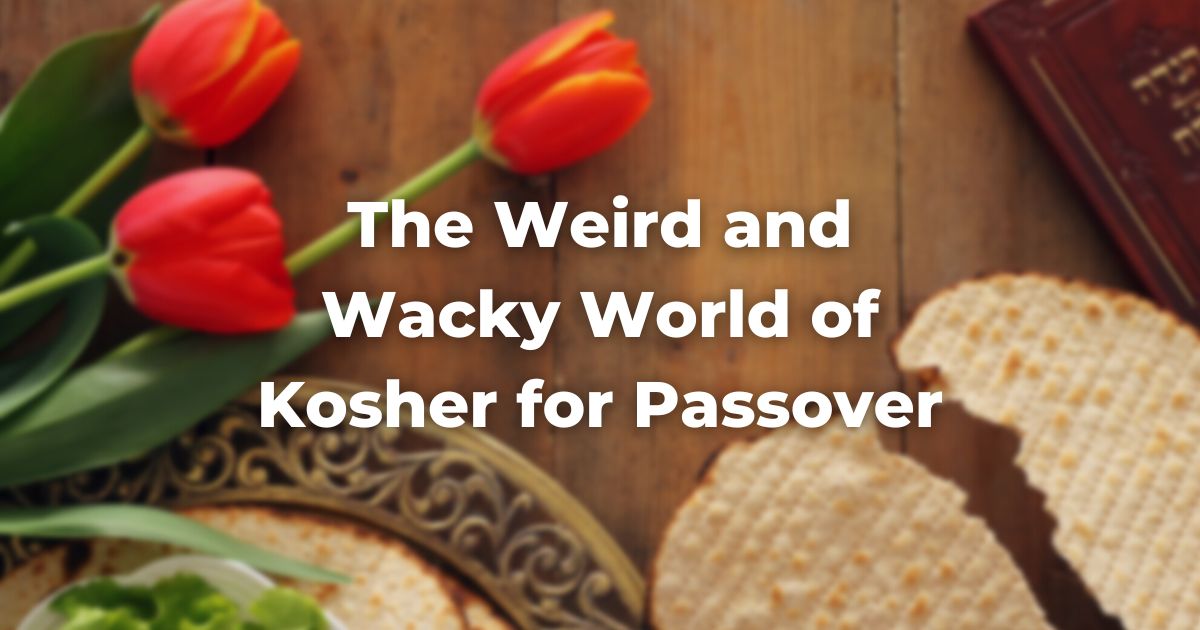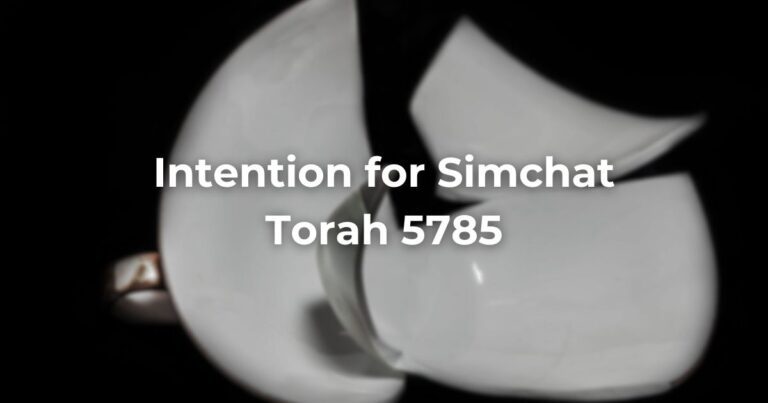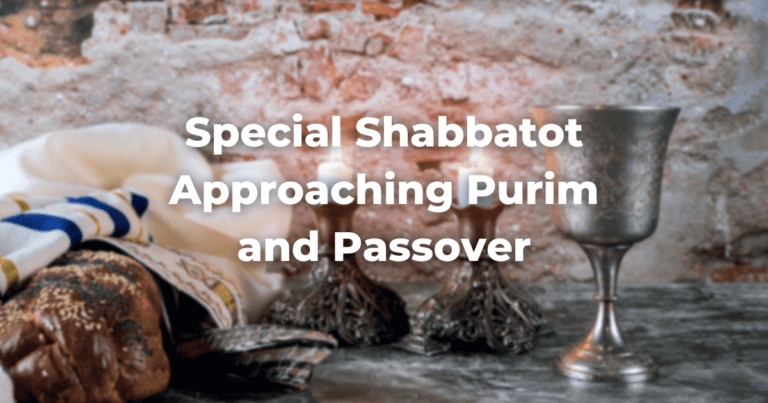“Seven days you shall eat unleavened bread; on the very first day you shall remove leaven from your houses, for whoever eats leavened bread from the first day to the seventh day, that person shall be cut off from Israel. […] No leaven shall be found in your houses for seven days. For whoever eats what is leavened, that person—whether a stranger or a citizen of the country—shall be cut off from the community of Israel. You shall eat nothing leavened; in all your settlements you shall eat unleavened bread.”
Exodus 12:15-20
To be clear, no one will be cut off from the Jewish community for their level of Passover observance.
And yet, the weird and wacky world of Passover kashrut has poignant Biblical and spiritual roots. On the eve of the tenth and most dramatic plague, God tells Moses to tell the people Israel to observe a series of mitzvot. This is something God has never asked the people of Israel to do before.
God asks the people to take on a custom each year, in this season, to roast a lamb, eat it with unleavened bread and bitter herbs, and to remove all leavened bread (hametz) from their homes and diets for seven days. Today, God’s food-focused Passover commandments have evolved into our modern Passover seder and abstinence from grains for seven or eight days each year.
One text-based Biblical reason for unleavened bread is the Israelites’ need to rush out of Egypt before their bread could rise. Another Biblical reason is our customs’ appeal to our curiosity. When we limit our diets and kitchens in certain ways, we inspire questions from children, which inspires us to teach about our Jewish historical memory.
Spiritual reasons abound, as well. Mitzrayim—Egypt in Hebrew—can also be translated as “narrow places.” This time of year gives us a chance to get out of those places and patterns that don’t serve us. It gives us a chance to get rid of the extra stuff, the hametz or leavening, that we don’t need.
Symbolically, we clean our homes of hametz as a reminder to us to clear our lives of any gunk that is getting in the way. More practically, clearing out hametz from the home gives us an excuse for some deep spring cleaning, to discover those items in the fridge or pantry that should have been tossed long ago. And of course, eating in a certain way over Pesah honors the memories of our ancestors, many of whom expressed their Judaism in precisely this manner for thousands of years.
Level 1: Ingredient-Kosher
While the Biblical and spiritual reasoning behind keeping kosher for Passover are all well and good, putting Passover kashrut into practice is not always easy.
Whether this is your first time keeping kosher for Passover, or you have tried in the past, and it didn’t quite stick, it can be helpful to try Passover kashrut in stages, one year at a time.
During your first intentional year, you may choose just to focus on ingredients. Traditionally, we abstain from barley, wheat, oats, spelt, and rye on Passover. In this first year, whenever you have access to an ingredients label, choose foods that do not contain any of these ingredients.
In an ingenious step, our tradition also asks us to remove these ingredients from our home; it’s not there when the craving hits on day five! Even if you live in a shared home, with a shared kitchen, you may want to designate a shelf or cabinet with just your food, and give your remaining crackers to a roommate or spouse before the holiday begins.
Remember that even keeping ingredient-kosher on Passover is much easier when working with fresh fruits, veggies, and dry goods, than trying to find acceptable processed foods. If processed foods are a necessity, those marked “gluten-free” will usually fit the bill.
Level 2: Kasher Your Kitchen
For one step further, you may choose to kasher your kitchen or to use only dishes that have not touched hametz.
For details on kashering, you may refer to this simplified guide or the Rabbinical Assembly’s Pesah Guide 5783.
If you’re planning on boiling or blowtorching your dishes and utensils anew each year, it may be easier to choose to eat on either meat or dairy dishes for the week, and to kasher just those dishes and utensils you know you’ll use.
Level 3: Look for the Tiny K-P
For one deeper step into Passover kashrut, you may choose to purchase only packaged foods that have a Passover heksher (kosher symbol), as it is a halakhic principle that even just a tiny bit of hametz can make a meal un-kosher for Passover.
However, hekshers get a little more lenient for items that are bought before Passover begins. Ingredients like baking soda, eggs, unflavored tea or coffee, extra-virgin olive oil, and whole spices and nuts don’t need a Passover hekhsher, regardless of when they are purchased.
The Day Before
With any extent of Passover kashrut you and your family choose to embrace, it is always a joy to end the process of preparing for Passover with the rituals of b’dikat hametz and biur hametz, checking for hametz and burning hametz.
See a one-pager for doing bedikat hametz and biur hametz here.
The evening before Passover, we turn off all of the lights at home and bring a candle around the house to check for any last crumbs. It’s customary to hide a couple of crackers or a slice of bread in a corner, so that there’s always something to find. Once the house has been searched, any leftover hametz is set aside to burn (yes, burn with fire) in the morning. After both the searching and the burning, we declare that any hametz that might be left in this house is null and void.
At the end of the day, no matter how much scrubbing we have done, we wholeheartedly accept our imperfection and declare an end to any worrying we may otherwise carry with us into our joyous Passover week.
(See more: Biur and S’mores: Have Fun As You Get Rid of Hametz)
You’re Not Alone
As many bits of meaning as I may add to keeping kosher for Passover, I can honestly say that Passover preparation drives me crazy every year.
If you are at all confused or overwhelmed in the days leading up to the holiday, please know that you are not alone. As Pesah is a time of celebration as much as it is a time of remembrance of slavery, our practice should not be one that inspires overwhelming stress or anxiety.
This Passover, I challenge each of us to embrace a practice that is both doable and just beyond our comfort level. The weird and wacky world of keeping kosher for Passover should be a process and practice that challenges us, inspires us, and reminds us of both the limits and great blessings of our freedom.
Author
-

Rabbi Sydni is originally from Agoura Hills, California. Previously, she served as the Rabbi of Agudath Achim in Shreveport, Louisiana. She has also served as a spiritual leader and teacher at Jewish organizations such as Ohr Shalom Synagogue (San Diego, California), IKAR (Los Angeles), and B’nai B’rith Camp (Neotsu, Oregon). Rabbi Sydni especially enjoys teaching, learning, reading, writing, and chatting about Jewish approaches to self-care, the status of women in Jewish law, and Biblical notions of love of God. When she is not at Congregation Beth TorahRefers to the first five books of the Hebrew Bible, the Tanakh, also called the Five Books of Moses, Pentateuch or the Hebrew equivalent, Humash. This is also called the Written Torah. The term may also refer to teachings that expound on Jewish tradition. Read more, you may find her practicing yoga, playing piano, or enjoying the season's produce. You may also find her spending time with her husband and best friend, Rabbi Feivel, their son Shalom Zimri, and their dogs Buddy and Marbles.
View all posts






